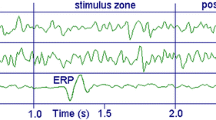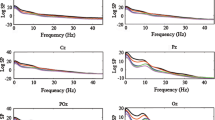Abstract.
A new method is presented for quantitative evaluation of single-sweep phase and amplitude electroencephalogram (EEG) characteristics that is a more informative approach in comparison with conventional signal averaging. In the averaged potential, phase-locking and amplitude effects of the EEG response cannot be separated. To overcome this problem, single-trial EEG sweeps are decomposed into separate presentations of their phase relationships and amplitude characteristics. The stability of the phase-coupling to stimulus is then evaluated independently by analyzing the single-sweep phase presentations. The method has the following advantages: information about stability of the phase-locking can be used to assess event-related oscillatory activity; the method permits evaluation of the timing of event-related phase-locking; and a global assessment and comparison of the phase-locking of ensembles of single sweeps elicited in different processing conditions is possible. The method was employed to study auditory alpha and theta responses in young and middle-aged adults. The results showed that whereas amplitudes of frequency responses tended to decrease, the phase-locking increased significantly with age. The synchronization with stimulus (phase-locking) was the only parameter reliably to differentiate the brain responses of the two age groups, as well as to reveal specific age-related changes in frontal evoked alpha activity. Thus, the present approach can be used to evaluate dynamic brain processes more precisely.
Similar content being viewed by others
Author information
Authors and Affiliations
Additional information
Received: 12 February 1996 / Accepted in revised form: 11 October 1996
Rights and permissions
About this article
Cite this article
Kolev, V., Yordanova, J. Analysis of phase-locking is informative for studying event-related EEG activity. Biol Cybern 76, 229–235 (1997). https://doi.org/10.1007/s004220050335
Issue Date:
DOI: https://doi.org/10.1007/s004220050335




